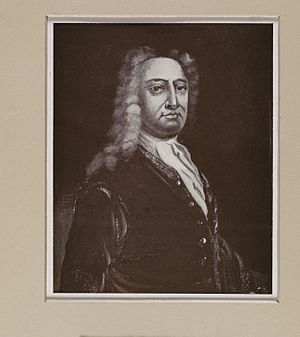Charles Radclyffe facts for kids
Quick facts for kids
Charles Radcliff, de jure Earl of Derwentwater
|
|
|---|---|

Charles Radcliff, de jure 5th Earl of Derwentwater
|
|
| Born | Charles Radcliff or Radclyffe September 3, 1693 Little Parndon, Essex, England |
| Died | 8 December 1746 (aged 53) Tower Hill, London, England |
| Title | de jure 5th Earl of Derwentwater |
| Known for | Jacobite |
| Nationality | English |
| Spouse(s) | |
| Issue | James Bartholomew Radclyffe, 4th Earl of Newburgh |
| Parents |
|
Charles Radclyffe (born September 3, 1693 – died December 8, 1746) was an English nobleman. He was known for supporting the Jacobite cause. This was a movement that wanted to bring the Stuart family back to the throne of Great Britain.
Charles Radclyffe was one of the few English people who took part in the Jacobite rebellions of 1715 and 1745. His family, the Radclyffes, were Catholics from Northumberland. They had strong ties to the exiled Stuart royal family. Charles was sentenced to death in 1716 but managed to escape. He then lived in Europe for 30 years.
In November 1745, he was captured at sea with his oldest son while traveling to Scotland. He was executed on December 8, 1746, based on the old warrant from 1716. His son, James, was later set free.
Early Life and Family
Charles Radclyffe was born on September 3, 1693, in Little Parndon, Essex, England. He was the youngest of three sons. His father was Edward, 2nd Earl of Derwentwater. His mother was Lady Mary Tudor, who was a daughter of King Charles II.
Charles had two older brothers, James and Francis, and a sister named Mary. His brother Francis passed away in France in May 1715.
On June 24, 1724, Charles married Charlotte Maria Livingston. She was the daughter of the 2nd Earl of Newburgh. Charles and Charlotte had children, including James and Mary. James later inherited his mother's title. Charles also had a daughter named Jane from an earlier relationship.
Supporting the Stuarts
The Radclyffe family were Catholics and had long supported the Stuart kings. Charles's grandfather, Sir Francis Radclyffe, was made an Earl by King Charles II. This happened when his son, Edward, married Lady Mary Tudor.
Charles's older brother, James, was educated at the Stuart court in France. In 1715, both James and Charles joined the Jacobite Rising. They led a group of about 70 friends and servants. They were captured at the Battle of Preston. Both brothers were found guilty of treason (betraying their country) and sentenced to death.
Even though people tried to save him, James was executed in February 1716. His title as Earl ended with him. In December 1716, Charles managed to escape from Newgate Prison. He got away with 13 other prisoners and fled to France.
After escaping, Charles spent many years in Rome, Italy. This was where the Stuart royal family lived after 1718. He even worked as a private secretary for Prince Charles, also known as Bonnie Prince Charlie.
Charles Radclyffe was also a Freemason. He was said to be a leader of the Grande Loge de France in 1738.
Capture and Execution
In November 1745, during another Jacobite rebellion, Charles and his son James were on a French ship. The ship was carrying weapons and supplies from France to Scotland. However, a British ship, HMS Sheerness, stopped them in the North Sea. Charles and James were taken to the Tower of London.
Charles had joined a French army regiment. This was a common tactic used by Jacobites. They hoped that if they were captured, they would be treated as prisoners of war instead of rebels. However, the British authorities usually rejected such claims.
The government decided to execute Charles using the old warrant from 1716. He was beheaded in December 1746. This was a less harsh form of execution than what was usually given for treason.
Charles wrote a letter to his wife, Charlotte, the night before he died. He was buried in the church of St Giles in the Fields in London.
His son, James, was later released and pardoned in 1747. In 1749, James married Barbara Kempe. He tried to get the family's old estates back, but they remained with the government. James later became the Earl of Newburgh after his mother passed away in 1755.
Images for kids
 | Shirley Ann Jackson |
 | Garett Morgan |
 | J. Ernest Wilkins Jr. |
 | Elijah McCoy |


